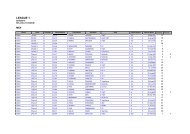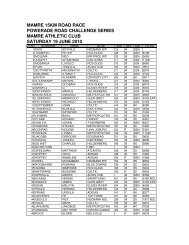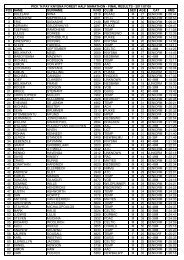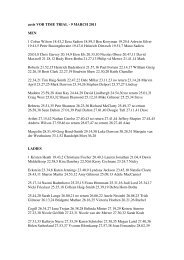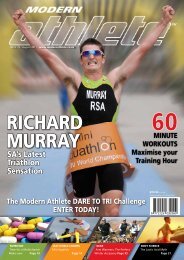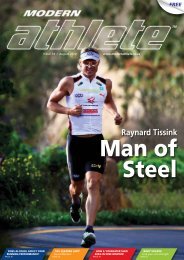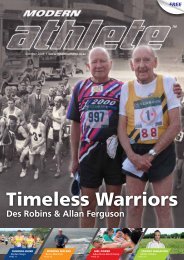Ryan Sandes - This will soon be the new home of the domain ...
Ryan Sandes - This will soon be the new home of the domain ...
Ryan Sandes - This will soon be the new home of the domain ...
You also want an ePaper? Increase the reach of your titles
YUMPU automatically turns print PDFs into web optimized ePapers that Google loves.
What is <strong>the</strong> potential effect <strong>of</strong> a<br />
protein supplement on improving<br />
exercise performance, increasing<br />
muscle glycogen levels and enhancing<br />
post-exercise muscle recovery?<br />
Protein has <strong>be</strong>en shown to have<br />
potentially important effects<br />
relating to exercise performance.<br />
Recent studies have investigated whe<strong>the</strong>r <strong>the</strong> ingestion <strong>of</strong> a<br />
particular form <strong>of</strong> protein called a protein hydrolysate<br />
(aka protein peptide) during exercise results in improved<br />
endurance exercise time to exhaustion or time trial performance,<br />
or improved recovery if ingested after exercise.<br />
MUSClE GlyCOGEN STORES<br />
One <strong>of</strong> <strong>the</strong> goals in sports nutrition is to achieve a rapid repletion<br />
<strong>of</strong> muscle glycogen stores after prolonged training. It is well<br />
established that when <strong>the</strong> muscle glycogen stores <strong>be</strong>come low,<br />
training <strong>be</strong>comes difficult and performance in races is suboptimal.<br />
Thus a high carbohydrate diet has <strong>be</strong>en recommended.<br />
Initially, findings suggested that <strong>the</strong> addition <strong>of</strong> protein, and<br />
especially protein hydrolysate, may increase <strong>the</strong> rate <strong>of</strong> muscle<br />
glycogen formation. <strong>This</strong> was attributed to <strong>the</strong> rapid absorption<br />
<strong>of</strong> <strong>the</strong> protein hydrolysate resulting in high insulin concentrations<br />
in <strong>the</strong> blood, which in turn causes an increased rate <strong>of</strong> glucose<br />
uptake into <strong>the</strong> muscle and subsequent more rapid formation<br />
<strong>of</strong> muscle glycogen. However, subsequent studies have shown<br />
that ingesting <strong>the</strong> same energy content in <strong>the</strong> form <strong>of</strong> additional<br />
carbohydrate, has <strong>the</strong> same effect.<br />
MUSClE GROWTH AND REPAIR<br />
A num<strong>be</strong>r <strong>of</strong> studies have shown that one <strong>of</strong> <strong>the</strong> amino acids,<br />
leucine, is effective at stimulating <strong>new</strong> protein formation i.e.<br />
muscle growth and repair. In addition, leucine has also <strong>be</strong>en<br />
shown to inhibit protein breakdown. Thus, not only is leucine<br />
important in switching on <strong>the</strong> pathway leading to formation <strong>of</strong><br />
<strong>new</strong> protein, but it also slows breakdown <strong>of</strong> existing protein.<br />
However, <strong>the</strong> proteins making up muscle, like o<strong>the</strong>r proteins,<br />
consist <strong>of</strong> a vast num<strong>be</strong>r <strong>of</strong> amino acids all linked toge<strong>the</strong>r in a<br />
specific way to form ‘muscle’. Thus, while leucine may switch<br />
on <strong>the</strong> muscle protein manufacturing process in <strong>the</strong> body, to<br />
<strong>be</strong> effective at repairing existing muscle protein or syn<strong>the</strong>sizing<br />
<strong>new</strong> protein, <strong>the</strong> o<strong>the</strong>r amino acids involved in building or repair<br />
<strong>of</strong> muscle must also <strong>be</strong> present. <strong>This</strong> is where <strong>the</strong> <strong>new</strong> protein,<br />
hydrolysates, <strong>be</strong>come potentially key role players, as <strong>the</strong>y contain<br />
leucine in fairly large quantity, as well as all <strong>the</strong> o<strong>the</strong>r amino<br />
acids which are needed to manufacture <strong>new</strong> protein (muscle).<br />
In our research with protein hydrolysate, we have also seen a<br />
‘switching on’ <strong>of</strong> <strong>the</strong> pathway leading to muscle formation.<br />
We were able to show this with <strong>the</strong> ingestion <strong>of</strong> only 0.2g/kg <strong>of</strong><br />
a protein hydrolysate immediately after exercise (although this<br />
was repeated over a period <strong>of</strong> a num<strong>be</strong>r <strong>of</strong> hours).<br />
REDUCING CORTISOl<br />
Cortisol is a hormone in <strong>the</strong> body which has many important<br />
functions and which increases in concentration during hard<br />
exercise. However, prolonged high concentrations are not<br />
desirable as this may cause a breakdown <strong>of</strong> muscle tissue.<br />
Ingestion <strong>of</strong> carbohydrates during prolonged exercise has <strong>be</strong>en<br />
shown to help reduce <strong>the</strong> increase in cortisol, while ingestion <strong>of</strong><br />
carbohydrate on completion <strong>of</strong> training has <strong>be</strong>en shown to bring<br />
<strong>the</strong> concentration down more quickly than if no carbohydrate<br />
is ingested.<br />
25<br />
Ingestion <strong>of</strong> a protein hydrolysate and carbohydrate during<br />
or immediately after exercise may have a three-fold effect:<br />
enhancing <strong>the</strong> rate <strong>of</strong> muscle glycogen resyn<strong>the</strong>sis, improving<br />
muscle repair (protein syn<strong>the</strong>sis), and reducing cortisol. Although<br />
research evidence to make definitive claims is still lacking, <strong>the</strong><br />
existing research findings are strongly suggestive <strong>of</strong> a <strong>be</strong>neficial<br />
effect from ingestion <strong>of</strong> a protein hydrolysate toge<strong>the</strong>r with<br />
carbohydrate during or immediately after training.<br />
SUMMARy AND RECOMMENDATIONS<br />
As an exercise physiologist, I remain cautious about<br />
over-interpreting <strong>the</strong> research findings, but as a consultant<br />
to athletes I advise that <strong>the</strong>re is sufficient research evidence<br />
to suggest that using a protein hydrolysate/carbohydrate<br />
mixture could improve recovery. In this regard, anecdotal<br />
evidence from athletes has <strong>be</strong>en very positive. For anyone<br />
wishing to try this <strong>the</strong>mselves, <strong>the</strong> mixture I recommend<br />
consists <strong>of</strong> 0.2g/kg body weight <strong>of</strong> protein hydrolysate<br />
and 0.8g/kg <strong>of</strong> carbohydrate, ingested within <strong>the</strong> first<br />
30 minutes after training.<br />
ANDREW N. BOSCH, PhD<br />
Modern Athlete Expert<br />
Associate Pr<strong>of</strong>essor<br />
University <strong>of</strong> Cape Town/ MRC<br />
Research Unit for Exercise Science<br />
and Sports Medicine<br />
Sports Science Institute <strong>of</strong><br />
South Africa



